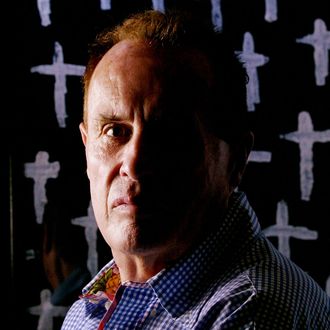
Kenneth Anger, a pioneer of experimental queer cinema and Hollywood chronicler, died on May 11. Sprüth Magers, the gallery that has shown his work since 2009, confirmed the news. “It is with deep sadness that we mourn the passing of visionary filmmaker, artist and author Kenneth Anger,” the gallery tweeted on May 24. “Kenneth was a trailblazer. His cinematic genius and influence will live on and continue to transform all those who encounter his films, words and vision.” Known for films that explore open-ended questions about dreams and unconscious desire, Anger constructed a similar kind of mystique about his own biography. He often said he was born in 1930, though an unauthorized biography by legendary sleaze chronicler Bill Landis lists Kenneth Wilbur Anglemyer’s date of birth as February 3, 1927, in the unauthorized biography Anger. The filmmaker also claimed he began his career playing the changeling prince in A Midsummer Night’s Dream (1935), but experts dispute the assertion. Anger’s directing debut came in 1947, when he released the film Fireworks to the ire of film censors. The homoerotic, dialogue-free black-and-white short was shot at his childhood home while his parents were away, depicting Anger in the arms of a man in the style of La Pietà. The film won a Los Angeles obscenity trial over its queer elements, such as a shot of a lit firework jutting out of a character’s pants and overall gay tension.
Anger made two dozen surrealist psychological pictures over the course of his artistic life, encountering the major creative and cultish forces of the era. In the 1950s, he worked as an assistant for famed film archivist Henri Langlois, who co-founded the Cinémathèque Française, an institution that inspired French New Wave artists. Anger cozied to Western occult religion Thelema with artist Marjorie Cameron and made his film Inauguration of the Pleasure Dome (1954) with Cameron and writer Anaïs Nin. He later teamed up with musicians Mick Jagger, Marianne Faithfull, and Bobby Beausoleil — the latter wrote the score for Anger’s Lucifer Rising (1980) while imprisoned for a conviction in connection to the Charles Manson murders. Some scholars claim his most refenced film, Scorpio Rising (1963), inspired the idea of modern music videos with its pop-rock soundtrack — it featured songs like Bobby Vinton’s “Blue Velvet” — and quick cuts of men on motorcycles. To make money, Anger wrote Hollywood Babylon, two loosely fact-checked gossip books about stars from the nascent days of the industry based around stories he had heard as a child and his own recollections. After a two-decade-long pause, Anger picked up the camera again in 1999 and continued to make films that inspired the likes of Martin Scorsese, John Waters, and David Lynch.


